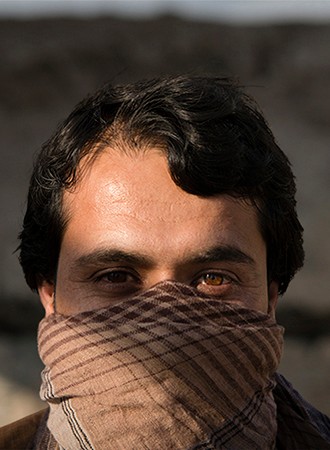
The Interpreters 2018
Distributed by New Day Films, 350 North Water Street Unit 1-12, Newburgh, NY 12550; 888-367-9154
Produced by Andres Caballero and Sofian Khan
Directed by Andres Caballero and Sofian Khan
Streaming, 76 mins
K-General Adult
Globalization; Immigration; War
Date Entered: 06/03/2020
Reviewed by Patti McCall-Wright, Systematic Review Librarian, University of FloridaHaving heard stories of Iraqis betraying the U.S. forces with whom they served, Sgt. Paul Braun made it clear to his team’s new Iraqi interpreter that “If you mess with more my soldiers, I will kill you.” The interpreter smiled broadly and started to laugh. Braun asked him what he found so amusing. Philip Morris paused, lit a cigarette and replied, “Someday you and I will sit in America and laugh at this conversation over a cup of tea.” Some fifty thousand interpreters served U.S. forces (and their contractors) in Iraq and Afghanistan. The U.S. missions in Iraq and Afghanistan depended on them to succeed. Americans did not speak the languages nor did they know the geography or the culture. Viewed as traitors to their own countries and to their religion, interpreters used false names, such as Philip Morris, kept their faces covered while working, and moved their families frequently out of fear they would be identified and killed by militants.
When U.S. forces left Iraq, they left a void, reaching the nadir of violence. The Special Immigration Visa program was developed as a means to fast track visas over a period of nine months to allow interpreters in Iraq and Afghanistan to leave the danger and move to the U.S. Instead, for those lucky enough to gain entry, the process took five years or longer, all the while they and their families await the news in imminent danger. Trump’s “America First” has made it even more difficult for these people to evacuate their homeland for safer territory. Time is the one commodity these men lack.
Informative, poignant, and gripping, The Interpreters shares the stories of three men, including “Philip Morris” who in the end, all made it to the U.S. but not without loss. Only a fraction of the fifty thousand who helped the U.S. have been allowed into the country. The U.S. does not keep track of how many died while waiting to hear back from the U.S. government. They served us faithfully and we turned our backs on most of them.
Awards:
Best Documentary, Austin Film Festival; Jury Documentary Award, Florida Film Festival; Moving Mountains Award, Mountainfilm Telluride